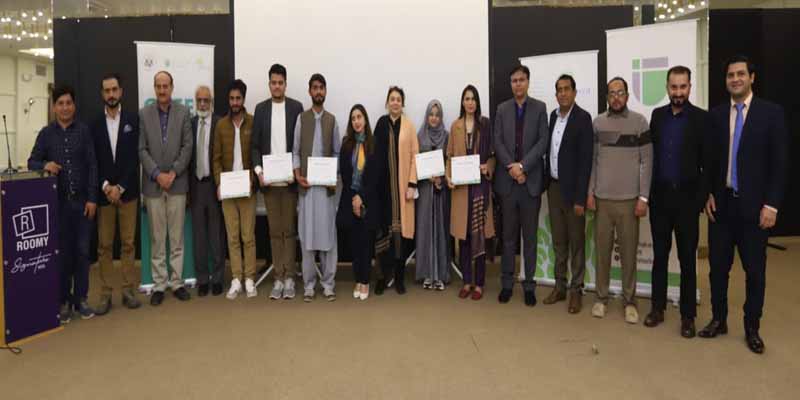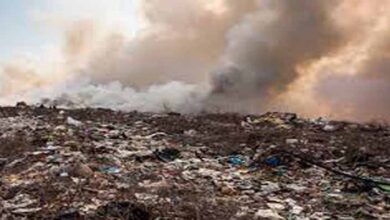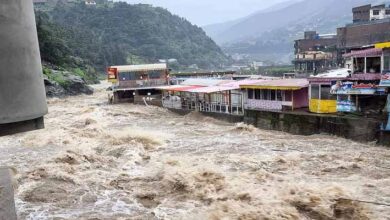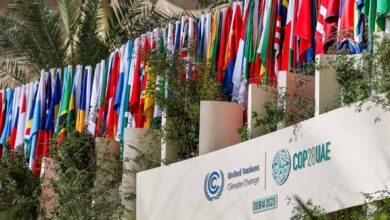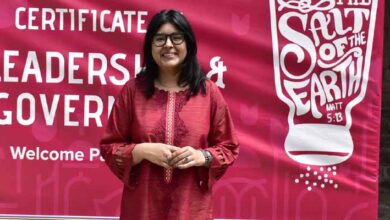Rethinking Urban Development in Pakistan: The Potential of Youth for Eco-Entrepreneurship
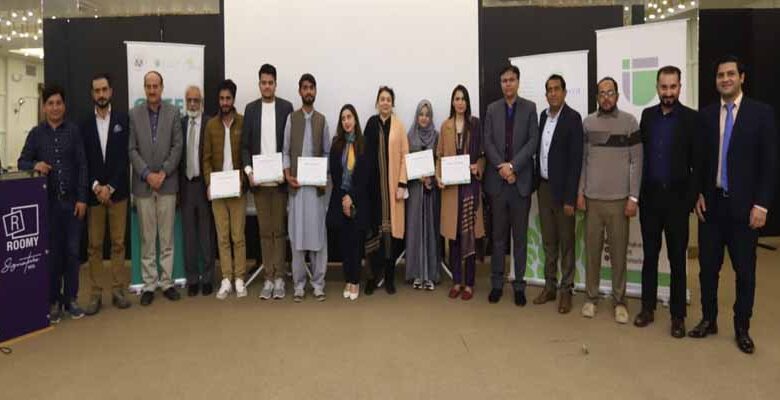
Managing urbanization well in Pakistan and aligning it with natural resource conservation is imperative for a livable and climate-resilient future. This entails a critical assessment of the current and future urban trends, incorporating principles of sustainability in the urban development process, and bringing together thinkers and implementers for co-creating solutions this complex problem. Youth can play an important role in this regard especially since youth forms a sizable segment of the population and is likely to be most impacted if proactive steps are not taken to enhance environmental protection.
Institute of Urbanism (IoU) and School of Leadership Foundation (SoLF) with the support of U.S. Embassy Islamabad organized a dialogue titled ‘Rethinking Urban Development in Pakistan: The Potential of Youth for Eco-Entrepreneurship’. In the session, the students of Quaid-i-Azam University (QAU) who were a part of the 02-month Green Urban Development School (GUDS) shared their projects they proposed for solutions on urban solid waste management and urban water management in Islamabad with the relevant experts, media, policy-makers, and researchers and discussed how such solutions can be scaled up in the city to create a long term impact to encourage green development practices in Islamabad.
In Pakistan, unleashing the potential of youth is the game changer in climate adaptation. Their fresh perspectives and innovative ideas break conventional boundaries, paving the way for sustainable solutions. Engaging youth is crucial for understanding local contexts, as their deep knowledge of community dynamics informs effective adaptation strategies for green urban development. These empowered youth aren’t just researchers; they become the driving force behind community outreach, advocating for policy changes that prioritize sustainability and resilience. In a nutshell, investing in youth engagement in climate adaptation research is the catalyst for a resilient and environmentally just future in Pakistan, said Mariyam Irfan, Managing Director at SoLF in her welcome remarks.
With the increase in various amenities and infrastructural development in urban environment, people are shifting from rural to urban areas, which results in the urban expansion. Most of this expansion is unplanned resulting in environmental degradation. One possible option is to look for sustainable and environmental friendly urban development. The GUDS (Green Urban Development School) program was developed to build the capacity of youth to introduce concepts of related to environment friendly urban development. While giving a brief about the program Dr. Ejaz Ahmad, Senior Program Fellow IoU, mentioned that under the GUDS program SOLF and IoU were able to build the capacity of 15 students from QAU during July-August 2023 in solid waste management, water conservation, green infrastructure. The participating students in the group of 4 reached this round where two of the groups will win the grants to work on their proposals.
Notably, Pakistan, facing environmental challenges such as air and water pollution, deforestation, and the impacts of climate change, requires dedicated efforts for sustainable urban growth. IoU, SoLF, and the US Embassy have played pivotal role in encouraging and promoting green urban development among the youth. Their collaborative efforts have resulted in the active participation of young individuals, fostering a sense of responsibility and empowerment among them to contribute to a more sustainable and resilient urban future for Pakistan. This was mentioned by Dr. Sohil Yousaf, Associate Professor of Environmental Sciences at Quaid-i-Azam University (QAU) while appreciating the GUDS in his special remarks.
Students from Quaid-i-Azam University who participated in the Green Urban Development School (GUDS) took the stage to present their proposed projects. These projects focused on innovative solutions for urban solid waste management and urban water management in Islamabad. The presentations were a culmination of the students’ two-month-long efforts in the GUDS program.
Implementing sustainable systems for water conservation at the household level is crucial for ensuring efficient use of this precious resource. First presentation was of Marfa Naseem, GUDS participants and student of QAU. She came up with the project titled “Sustainable Systems for Households”. In response to the escalating challenges of water scarcity, and reduced access to fresh, organic products in Islamabad and Rawalpindi. She will introduce an integrated solution for urban households by implementing rainwater harvesting, and vertical garden systems to address critical issues tied to rapid urbanization. The initiative will not only mitigate resource strains but will promote self-sufficiency in water and food production also. Tailored to individual household needs, her project will offer a holistic approach, fostering a sustainable and comfortable urban lifestyle while enhancing community engagement. Through this endeavor, she aims to transform urban living, improve well-being, and set a precedent for eco-friendly practices in the region.
Eco-organic fertilizer will address the need for sustainable fertilizers and the efficient management of organic waste which will help solve major problem of organic waste management. In the second presentation Aqsa Arshad and Waseem Ahmed Khattak – GUDS participants and students of QAU- presented their work titled “Addressing Urban Environmental Challenges Through Eco-Organic Fertilizer Production from Organic Waste” The students came up with the idea of company which will be using food waste to produce organic fertilizer by Green Technology. Doing so will decrease the total waste to be dumped at the dumping sites which will solve the waste issues. Eco-organic fertilizer will produce an organic fertilizer which will be environment friendly and will give nutrient to the soil lending a hand to enhance the organic agriculture. Apart from this, eco-organic fertilizers will also preserve the wholesome of the ecosystem which will not break down the food chain.
The problem of plastic in urban areas poses a multifaceted challenge, encompassing environmental, social, and health concerns. Third presentation was by Syed Khalid Shah and Usama Imtiaz, GUDS participants and students of QAU. They presented their project titled “PlastiLect”. Their project will address the pervasive challenge of urban plastic waste by offering a comprehensive infrastructure for collection, segregation, and recycling. It will tackle the pressing issue of plastic pollution within urban areas, contributing significantly to sustainable urban development goals. By efficiently managing plastic waste, it will prevent clogging of drainage systems, safeguard water sources, and will reduce the burden on landfills. Furthermore, PlastiLect will embody circular economy principles by repurposing plastic into valuable resources, fostering a cleaner, greener urban environment for generations to come.
Out of above presented projects, two were announced as winners of grant Rs. 500000 each to work on their proposed projects. All the participating students were presented certificates and the winners were announced by Samima Durrani, Head of Finance and Operations IoU. She encouraged the good work of students and appreciated the winning teams. Project ideas of Marfa Naseem and; Aqsa Arshad & Waseem Ahmed were the winners.
The event featured an engaging dialogue between GUDS students and experts, divided into two groups. Group 1, led by Iftikhar Zeb, Assistant Professor at COMSATS University, focused on Sustainable Urban Solid Waste Management. Group 2, under the guidance of Sher Shah, Founder Skillistan, delved into Sustainable Urban Water Management. The discussions aimed at exploring practical solutions and scaling up the proposed projects for a lasting impact on green development practices in Islamabad.
The problem of solid waste in urban areas can be solved by shared responsibility by all stakeholders in community, said Dr. Iftikhar Zeb. It is not possible by government alone to deal with such a massive amount of waste in urban areas. This was highlighted by Hamid Iqbal, Senior Manager Operations Rawalpindi Waste Management Company who was in dialogue from the government sector. Asghar Hayat and Aisha Naz , journalists, also answered multiple questions from the students of the group.
Innovative ideas and models from other countries can really help in dealing with water issues in urban areas, said Sher Shah. Community also need to realize its due role in preserving water by all possible means. This was highlighted by Sardar Khan Zimri, Director General Water Management Capital Development Authority. Fakhar yousafzai, Senior Journalist, moderated the dialogue.
The ‘Rethinking Urban Development in Pakistan’ dialogue provided a platform for meaningful discussions, recognizing the potential of youth-led eco-entrepreneurship in creating sustainable solutions for the challenges posed by rapid urbanization. The engagement between students, experts, and facilitators marked a significant step towards a more resilient and livable urban future in Pakistan.
